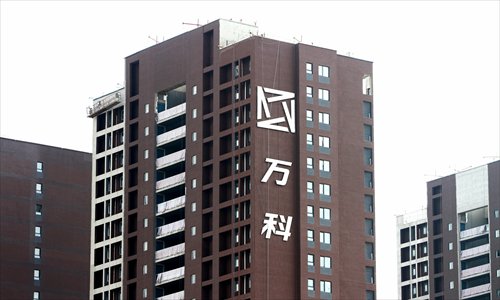HOME >> BUSINESS
Tax agencies seen as main factor for property developer not paying LAT
By Yang Jing Source:Global Times Published: 2014-1-1 23:28:01

A Vanke real estate project in Taiyuan, North China's Shanxi Province Photo: CFP
The failure of the country's taxation agencies to perform their duties was the main cause of the country's largest real estate developer's delay in paying land appreciation tax (LAT), analysts said Wednesday.China Central Television (CCTV) aired a report Monday alleging that China Vanke Co failed to pay more than 4 billion yuan ($660 million) in LAT by the end of 2012.
The first phase of Vanke Cheng, a Vanke project in Jilin, Northeast China's Jilin Province, met the settlement condition when construction was completed in December 2012 because its 88 percent pre-sale rate was higher than 85 percent, which is one of the settlement conditions set by law, CCTV said.
Based on Vanke's annual reports, the first phases of Vanke's three projects in Guangzhou, South China's Guangdong Province, all met the LAT settlement conditions in terms of pre-sale rates in 2010, 2011 and 2012 respectively, the report said.
According to Vanke's 2012 annual report, Vanke has more than 30 projects all over the country that have a pre-sale rate higher than 85 percent, CCTV reported.
Vanke released a statement Tuesday on the Shenzhen Stock Exchange website and denied the blame.
The gross profit rate of Vanke Cheng in Jilin is 16 percent so the project should enjoy tax reimbursement, according to Vanke's statement. The other three projects in Guangzhou have not been sold out, the statement said.
There are two kinds of LAT settlement conditions.
The first category covers the project being completed and sold out, or the whole project or land use right is transferred, Yang Hongxu, vice president of the Shanghai-based E-house China R&D Institute, said on his Weibo account Wednesday.
Vanke applied the first category in its statement and as the statement said, Vanke has no responsibility to apply for settlement if its four projects have not met the conditions, according to Yang.
Meanwhile, the second category of settlement conditions includes project sales higher than 85 percent, or having a sales license for more than three years, Yang said, noting that for these circumstances, it is up to official tax departments to require LAT settlement.
If the local tax department does not require the LAT settlement, Vanke does not have to apply for the LAT settlement for the more than 30 projects mentioned in the CCTV report, Yang said.
The renewed dispute between CCTV and Vanke over LAT was preceded by a CCTV report in November which alleged that 45 major listed property companies in the country failed to pay 3.8 trillion yuan ($624 billion) in land appreciation tax (LAT) between 2005 and 2012, citing calculations by Li Jinsong, a Beijing lawyer and certified tax agent.
Vanke should explain what gross profit rate the company used for the LAT prepayment calculation and how much LAT has been withheld, or there is a possibility of income tax evasion by enhancing withheld reserve by purpose, Li told the Global Times Wednesday.
As for the other three projects in Guangzhou, Li said the CCTV report clearly pointed out the first phases rather than the whole phases of the projects met the LAT settlement condition but Vanke mixed up the details on purpose.
The double LAT settlement conditions left loopholes for the real estate developers, and the local tax departments as well as the State Administration of Taxation failed to fulfill their duties, Li said.
Posted in: Companies